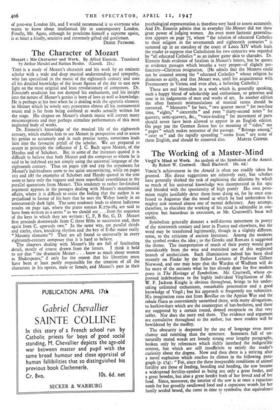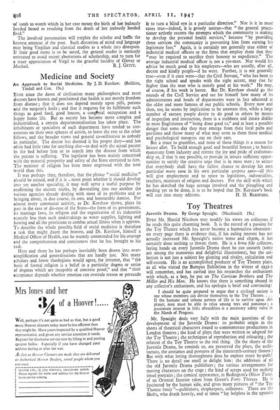The Working of a Master-Mind
VIRGIL'S achievement in the Aeneicl is often too readily taken for granted. His direct suggestions are relatively easy, but scholars have generally shirked the task of explaining the allusions by which so much of his universal knowledge was incorporated in his epic and blended with the spontaneity of high poetry His own pessi- mism might justifiably deter them from doing so for he once con- fessed to Augustus that the mood in which he had undertaken his mighty task seemed almost one of mental deficiency. Any attempt, therefore, to elucidate the working of his mind is admirable in con- ception but hazardous in execution, as Mr. Cruttwell's boox will testify. Symbolism generally denotes a well-known movement in poetry of the nineteenth century and later in France and elsewhere' but the word may be transferred legitimately, though in a slightly different sense, to the criticism of ancient literature. Among the moderns the symbol evokes the idea ; to the Greeks and Romans it suggested the theme. The interpretation of much of their poetry would gain considerably from the wise and restrained use of this neglected branch of aestheticism. Such illumination indeed has been shed recently on Pindar by the Sather Lectures of Professor Gilbert Norwood, and one may hope that the Warden of Wadham will do for more of the ancients what he has already done for five modern poets in The Heritage of Symbolism. Mr. Cruttwell, whose ex- pressed indebtedness to the highly individual Virgilianism of Mr. W. F. Jackson Knight is obvious throughout, brings to his under- taking unlimited enthusiasm, remarkable penetration and a good knowledge of Virgil ; but his approach is frequently too subjective. His imagination runs riot from Bovillae on the Appian Way and the tabula Iliaca so conveniently unearthed there, with many divagations, to beehive-huts which are the counterpart of hut-beehives, and these are suggested by a certain round, domed receptacle on that very tablet. Nor does the story end there. The evidence and argument are cumulative throughout to the author, but most readers will be bewildered by the medley.
The obscurity is deepened by the use of language even more clumsy and rambling than the structure. Sentences full of un- naturally mated words are loosely strung over lengthy paragraphs, broken only by references which richly interlard the indigestible context, but which are still insufficient to satisfy the reader's curiosity about the _dogma. Now and then there is a striving after a novel euphuism which reaches its climax in the following para- graph (p. 174): " Fccr, since the three inseparable conditions of animal fertility are those of feeding, breeding and heeding, the sow became a widespread fertility-symbol as being not only a great feeder, and a great breeder, but also a great heeder both of her brood and of her food. Since, moreover, the interior of the sow is at once a rapacious tomb for her greedily :wallowed food and a capacious womb for her lustily seeded brood, she came in time to symbolise that equivalence -of tomb to womb which in her case meant the birth of her jealously heeded brood as resulting from the death of her jealously heeded food."
The involved presentation will rerplex the scholar and baffle the keenest amateur of the poet. Such distortion of mind anil language may bring Virgilian and classical studies as a whole into disrepute. If their good name is to be saved, the general reader is earnestly entreated to avoid recent aberrations of scholarship, and to turn for a truer appreciation of Virgil to the graceful lucidity of Glover or



































 Previous page
Previous page